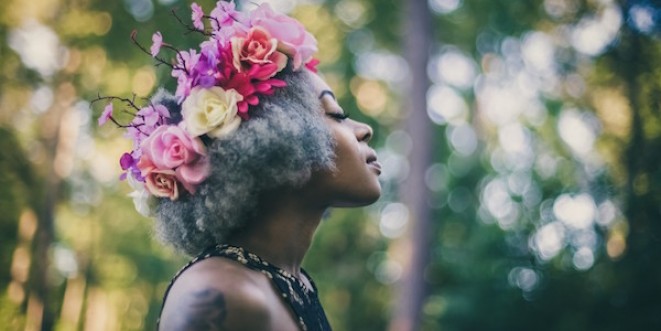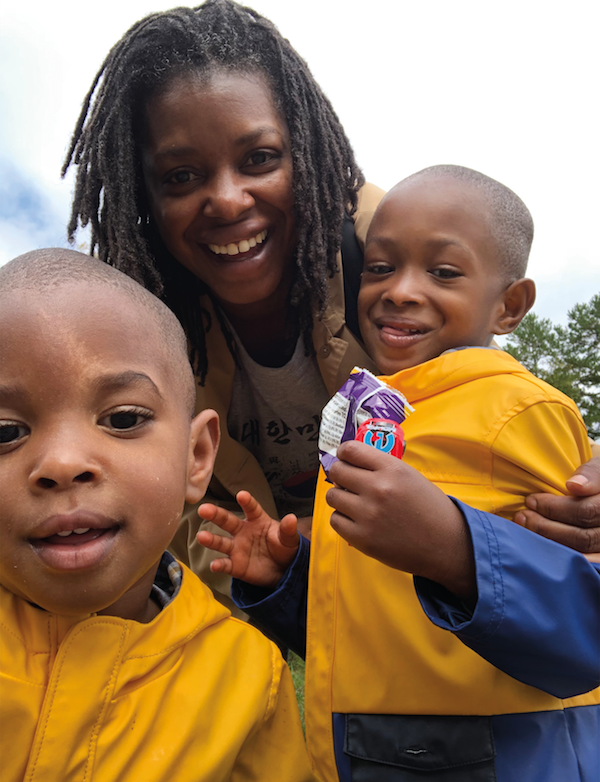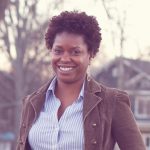This is My Abortion Story
By Nikki IgboPublished: September 5, 2021

This essay was first published in Radiant No. 15, The Motherhood Issue.
My name is Nikki. I’m the mother of two bright, beautiful, healthy, energetic sons. Twenty-five years ago, I had an abortion.
I’d become pregnant by my boyfriend just before leaving for my freshmen year of college, but I didn’t know it at the time. We’d practiced safer sex—making sure to read and follow the directions on the condom box. I’d gotten my period for the next two months without fail.
Time marched forward into a move to New Orleans, a summer academic honors program, and freshmen orientation. Then I began having all kinds of digestive issues. First constipation and then the runs. I could not sleep enough. Food tasted odd. I called my sister to explain my troubles and paused in shock when she advised me to take a pregnancy test.
I recall sneaking my purchase from K&B Drugs back to the dormitory toilets, taking the test, putting the stick in my cardigan pocket, washing my hands, and then burying the empty box at the bottom of the trash can before going to my dorm room to take a nap. I woke up an hour later willing myself to just have some sort of strange flu. When I pulled the test from my sweater pocket, it confirmed that I was pregnant.
I sat there on my bed and cried alone in silence. Then I called my boyfriend.
“I just took a pregnancy test and I’m pregnant,” I said without bothering to say hello.
“Then you’re coming back to California, right?”
That was definitely not the response I expected.
Many of the things he revealed during that call came as a surprise to me. I learned that people do strange things in the name of what they think is love. Sometimes strange, life-altering things involving stick pins and condom wrappers.
I also learned that we did not want the same things for or from each other. I was not interested in raising any child in a home that would be filled with more discord than affection. Life would already be difficult enough.
I knew well before that call that I was not ready for motherhood. I didn’t even know quite who I was yet. What did I possibly have to offer to a baby? Not nearly enough, I thought. I did not want to ruin a child’s life with my inadequacies. I knew that I would regard motherhood as an apt punishment for my premarital sex sins, but the main recipient of that punishment would be an innocent baby. I did not want to resent a child for nothing more than being born. I did not want to resent my child’s father. I did not want to resent myself.
I’d thought about these things all throughout junior high and high school as classmate after classmate became pregnant. I’d witnessed them hiding their pregnancies under puffy jackets even in the heat of the California sun. I’d had conversations with them about what their future held as a teen mom. I did not want those things for myself or an unplanned child. I’d also overheard girls in the locker room discussing their abortions, and I had not wanted that for myself either.
Still there I was, a smart girl with what I considered a dumb problem, poised to become a statistic either way. I’d not gotten pregnant on my own, but I knew I would bear the burden of my decision alone, because I recognized even then the stigma attached to a woman not wanting to be a parent.
I researched abortion clinics in New Orleans and arranged to take a taxi to the nearest location. I recall the taxi driver pulling up to the clinic and saying, “This is the place gals go to kill their babies and what not. You want me to let you off here?”
I tossed the exact amount of fare at the man and ignored his request for a tip. Then I walked through a small parade of pro-life protestors, entered the clinic, signed in at the reception desk, and sat there in the lobby for about ten minutes. I wound up leaving before my name was called and caught the bus back to campus.
It took me another a day or two to get up the nerve to call my mom and tell her what had happened, what I’d done, what shame I felt.
Mom never expressed disappointment with me. She cried on the phone right along with me, taking the heaviness I felt and making it her own. I believe she already knew that no one would punish me more than I would punish myself.
I flew back to California soon after, stealing away to the airport from my college campus in the night and sleeping the entire six-hour flight back home. I received a surgical abortion through my mother’s insurance coverage the following morning. I stayed at home and slept in my mother’s bed that night.
The Next Chapter
The next day, I was back on the plane to New Orleans determined not to make the same mistake. Determined to figure out how I could eventually become the mother I did one day want to be. I considered myself fortunate to have the resources, opportunity, and support to take back control of a situation I felt I’d not exercised enough control over in the first place.
I focused on my education and what I had to contribute to the world. I also began taking birth control pills and engaging in whatever methods or strategies or activities I could to avoid becoming pregnant again. I ran from sex, relationships, commitment. I did not want to play house with anyone. I wanted to craft what I believed were the right conditions in which to raise a child: disposable income, a comfortable home in a safe neighborhood, marriage to someone with traditional family values.
I fought unintended pregnancy and won that fight for the next 18 years. Then I met and married an appropriate candidate for starting a family and marched toward motherhood eagerly. We began to prepare our lives and home for children. I tried so hard to bring about a positive pregnancy test after having spent so many years doing the opposite. I read every book I could, ate fertility foods, took vitamins, exercised, tried every baby-making position, and it just wasn’t happening.
I consulted with a gynecologist and underwent a series of tests, each seemingly more intrusive and embarrassing than the last. It felt like most of the staff at the hospital had seen or touched my naked lower half. After what seemed like a million tests later, the doctor tentatively attributed my infertility issues to endometriosis, a condition in which the endometrium—tissue that ordinarily lines the uterus—grows outside of the uterus and in other areas where it doesn’t belong.
I didn’t know if the birth control pills had triggered it. I just knew that my periods had become longer and more painful after I began taking them. I’d chalked my new period experiences up to being the price I needed to pay for the abortion I’d had and for any future abortions I wanted to prevent.
Despite all the tests, my doctor could not confirm that I actually had endometriosis until I underwent an outpatient surgery to detect and remove my endometrial scarring. When I saw the images of what my doctor removed, I couldn’t believe how tiny the scars were. I couldn’t believe that such minute disruptions could stand in the way of new life.
When it was okay to try for pregnancy again, I did. I became pregnant twice. I miscarried twice. Those were the hardest experiences of my life. Mostly because no one could tell me why those pregnancies weren’t viable and no one could make me believe that those losses weren’t payback for the abortion I had.
At the exact moment I learned that my fetus no longer had a heartbeat, I wish I could have just talked to someone else who had experienced the same thing. I wish I could have just heard from someone else to know that I could get through this with my heart and my soul and my mind intact. In fact, I wish that doctors provided all women with the option of counseling whenever a pregnancy terminates, whether by abortion, miscarriage, or otherwise.
I truly needed to talk to someone, but I stayed silent and I hid within myself because I could not escape the belief that I controlled everything that happened within my body. I felt that I should have known what to do and what not to do in order to have the children I wanted. I did not realize how unfair and unforgiving I was being to myself.
Right on Time
After the last miscarriage, I sat in my room binge-watching Breaking Bad on Netflix specifically because the show had little to do with babies and was the escape I so desperately needed from my own thoughts. I didn’t talk to anyone on the phone. I didn’t receive visitors. I barely ate. I slept often. Two weeks passed before I went back to my graduate internship and the final months of my graduate program. I put all my thoughts and energy into those things because they served as another form of departure.
But God is faithful. Though I had doubts about anything omnipotent, omniscient working in my life, I could not help but recognize the presence of a higher power. My managing editor at the time told me about the five back-to-back miscarriages she’d had. The depression she’d fallen into. How she felt as if she had to keep silent so as not to upset all the other women around her who were enjoying their own pregnancies and new adventures in motherhood. And then she showed me the picture of her nine-month-old son and reminded me that my story was not yet over.
Somewhere along the way, I made up my mind to let go and be at ease with whatever past, present, and future I was meant to experience. I decided to accept what had happened as my truth. I decided not to pass judgment on that truth. These things in my life had happened but I was still here and I’d experienced them for a reason. I completed my thesis and earned my MFA in Writing four months later.
I also became pregnant again.
I was six months pregnant when I walked across the stage to receive my degree. A few months after that, I gave birth to Osinachi—a child who arrived exactly on his due date.
As time went on, I realized how blessed I was even in my mistakes, my missteps, my ignorance, my faults. I’d lived through them, I’d learned from them, and I gained the courage to not let those experiences go to waste. When a younger family member experienced abortion, I was able to be a sounding board and give guidance, comfort, and clarity. When my close friend experienced miscarriage, I was able to be the faithful sister and cheerleader my managing editor had been to me.

Writer Nikki Igbo and her boys
And most recently, I was able to be a confidante to another good friend who also had experienced both abortion and fertility issues. Though I did not have a solution for her, I was able to reassure her that she was beautiful, strong, worthy, and not alone—and that if she wanted motherhood, she would somehow have the desires of her heart.
I decided to share this story after agonizing over it for such a very long time. I don’t have a clear reason for why I had sex with a man whose child I did not want to have, though I know some will read this and fault me for that. But that’s okay. I’ve faulted myself for that too, even though I know I’d likely make all the same decisions I had before.
I say that because I don’t quite know if I’d be the mother I am, or if my children would be who they are, if I’d done anything differently. I also know that when the time comes to tell them about matters of sex and love and pregnancy and choices, I’ll be ready and unafraid to give them what they need to do better than I did.
Download your free digital edition of Radiant at radianthealthmag.com/free.
Like what you're reading? Sign up for our free newsletter and never miss a post! Plus get a FREE digital version of our Issue No.10 with sign up.

- Tracee Stanley On the Path To Finding Deep Rest in a Chaotic World - July 19, 2024
- This is My Abortion Story - September 5, 2021
- Dr. Tererai Trent: Rising From The Ashes To A Life That is Greater - May 24, 2021
- 12 Impactful Ways To Give Back on Giving Tuesday - November 2, 2014
- Annie’s All Good: The Irrepressible Intensity of Annie Ilonzeh - July 30, 2019
- Uzo Aduba On The Good Road To The Top - June 8, 2015
- Strength Training: Can You Build Lean, Sleek Muscles with Yoga? - October 6, 2017
- 10 Must-Know Nigerian Women In Fitness - January 14, 2015
- My Pregnancy Journey: A False Labor Adventure - September 8, 2015
- My Pregnancy Journey: Heartburn, Itchy Feet And Other Third Trimester Challenges - September 1, 2015











